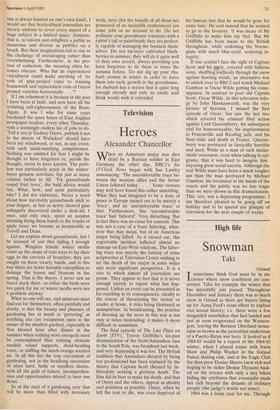Television
Heroes
Alexander Chancellor
When an American major was shot dead by a Russian soldier in East Germany the other day, BBC1's Six O'Clock News began with Sue Lawley announcing: 'The uncomfortable truce be- tween the western allies and the Soviet Union faltered today . . . .' Some viewers may well have found this rather unsettling. What they had imagined to be a state of peace in Europe turned out to be merely a 'truce', and an 'uncomfortable truce' at that. Furthermore, this 'uncomfortable truce' had 'faltered'. Very disturbing. But in fact there was no cause for concern. This was not a case of a truce faltering, what- ever that may mean, but of an American major being killed. As it turned out, this regrettable incident inflicted almost no damage on East-West relations. The falter- ing truce was merely the fantasy of some scriptwriter at Television Centre wishing to set the death of the major in some wider and more significant perspective. It is a vice to which almost all journalists are prone. They appear to feel that it is never enough merely to report what has hap- pened. Unless an event can be presented as far-reaching in its consequences, ideally to the extent of threatening the viewer or reader at home, it risks being dismissed as unimportant. In broadcasting, the practice of dressing up the news in this way is not only at times misleading; it makes it more difficult to assimilate.
The final episode of The Last Place on Earth (ITV), Trevor Griffiths's six-part dramatisation of the Scott/Amundsen race to the South Pole, was broadcast last week, and very depressing it was too. The British tradition that Amundsen cheated by being too professional has been replaced by the theory that Captain Scott cheated by de- liberately seeking a glorious death. The film did its best to make his death, and that of Oates and the others, appear as shoddy and pointless as possible. Oates, when he left the tent to die, was even deprived of
his famous line that he would be gone for some time. He said instead that he wanted to go to the lavatory. It was mean of Mr Griffiths to make him say that. But Mr Griffiths has been mean to the British throughout, while endowing the Norwe- gians with much blue-eyed, seafaring in- tegrity.
If one couldn't face the sight of Captain Scott and his party, covered with hideous sores, shuffling endlessly through the snow against howling winds, an alternative was to switch over to BBC2 and watch Michael Gambon as Oscar Wilde getting his come- uppance. In contrast to poor old Captain Scott, Oscar Wilde, in this television trilo- gy by John Hawkesworth, was the very picture of heroism. I missed the first episode of Oscar, but saw the last two which covered his criminal libel action against Lord Queensberry, his subsequent trial for homosexuality, his imprisonment in Pentonville and Reading jails, and his final exile and death in France. Queens- berry was portrayed as farcically horrible and mad; Wilde as a man of such melan- cholic sweetness, even when talking in epi- grams, that it was hard to imagine him enjoying great social success. Although the real Wilde must have been a much tougher nut than the man portrayed by Michael Gambon, his treatment at the hands of the courts and the public was no less tragic than we were shown in this dramatisation. This, too, was a depressing programme. I am therefore pleased to be going off on holiday and to be spared any glimpse of television for the next couple of weeks.










































 Previous page
Previous page